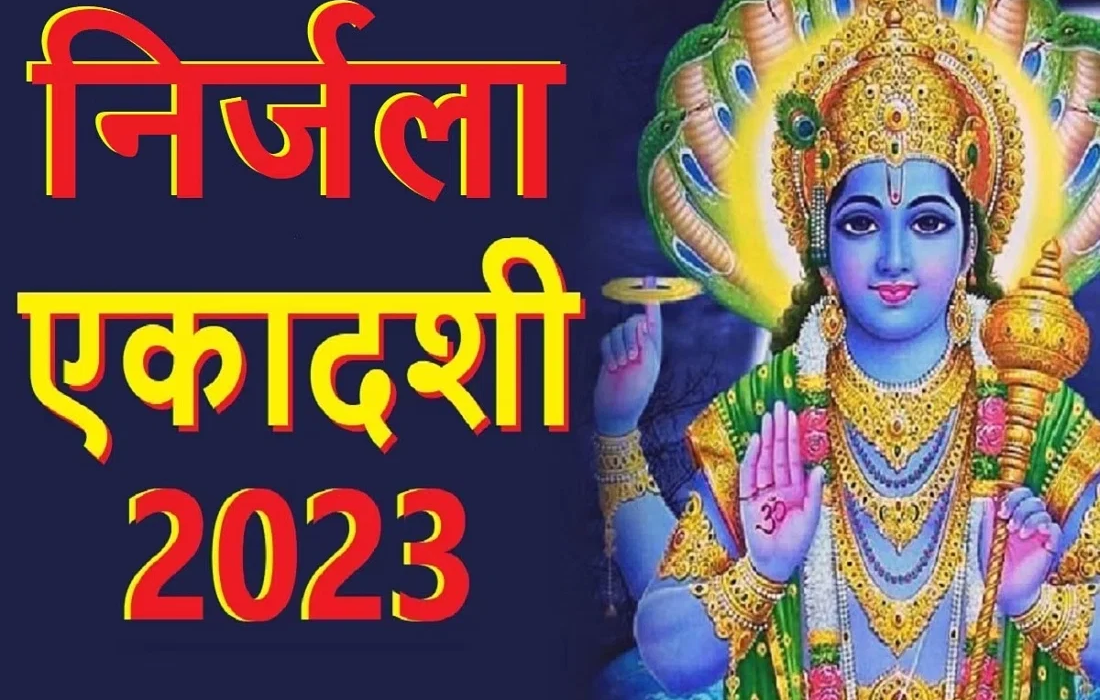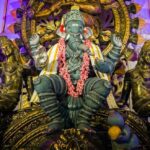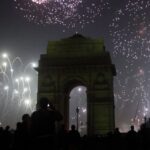Nirjala Ekadashi, otherwise called Pandava Ekadashi, is a huge Hindu celebration celebrated with incredible intensity and commitment. According to the Hindu lunar calendar, it occurs on the 11th day (Ekadashi) of the waxing phase (Shukla Paksha) in the month of Jyeshtha. In the year 2023, Nirjala Ekadashi holds an exceptional spot in the hearts of millions, as fans set themselves up for a day of extraordinary fasting and profound examination. This article digs into the meaning of Nirjala Ekadashi, investigates its ceremonies and customs, and reflects upon the human feelings evoked by this consecrated event.
What is Nirjala Ekadashi?
Nirjala Ekadashi, also known as Pandava Bhim Ekadashi, is an important Hindu religious observance that falls on the eleventh day (Ekadashi) of the waxing phase of the lunar month of Jyeshtha. Unlike other Ekadashi fasts, Nirjala Ekadashi requires devotees to abstain from not only food but also water, making it a rigorous and challenging day of fasting.
The Legend behind Nirjala Ekadashi
According to ancient Hindu scriptures, the significance of Nirjala Ekadashi is deeply rooted in the epic tale of Mahabharata. It is believed that Bhim, the second Pandava brother known for his immense strength and voracious appetite, was unable to observe regular Ekadashi fasts due to his inability to control his hunger.
Realizing the importance of fasting on Ekadashi, Bhim approached the sage Vyasa for a solution. Sage Vyasa, known for his wisdom and foresight, advised Bhim to observe a single, intense fast on Nirjala Ekadashi, which would grant him the spiritual benefits equivalent to observing all the Ekadashi fasts throughout the year.
Impressed by the sage’s wisdom, Bhim wholeheartedly embraced the rigorous fasting on this auspicious day. His dedication and devotion towards the fast earned him the blessings of Lord Vishnu, and since then, Nirjala Ekadashi has been observed in his honor.
Rituals and Observances
Preparation and Pre-fasting Rituals
Devotees who wish to observe Nirjala Ekadashi start preparing well in advance. The day before the fast, they wake up early in the morning and take a holy bath (snan) to purify their bodies and minds. Following the bath, devotees visit temples to seek blessings and perform special prayers.
The Rigorous Fasting
Nirjala Ekadashi fasting is considered one of the most challenging fasts in the Hindu tradition. Unlike other Ekadashi fasts where certain food items are permitted, Nirjala Ekadashi demands a complete abstention from both food and water for a full 24-hour period.
Devotees wake up early on Nirjala Ekadashi and offer prayers to Lord Vishnu. Throughout the day, they engage in meditation, recitation of holy scriptures, and bhajans (devotional songs) to intensify their spiritual connection. The fast concludes on the next day, Dwadashi, after sunrise, following which devotees break their fast with a sattvic meal.
The Spiritual Significance
Nirjala Ekadashi is believed to bestow immense spiritual benefits upon devotees who observe the fast with unwavering dedication. It is said that by abstaining from food and water, devotees not only purify their physical bodies but also cleanse their minds and souls.
The rigorous fasting on this day is seen as a way to seek forgiveness for past sins, attain spiritual enlightenment, and strengthen one’s faith in Lord Vishnu. Devotees believe that observing Nirjala Ekadashi can wash away the negative karma, grant blessings, and bring prosperity, peace, and happiness into their lives.
The Significance of Nirjala Ekadashi:
In Hindu mythology and religious practices, Nirjala Ekadashi holds significant significance. It is accepted that noticing a severe quick on this day is comparable to seeing all the Ekadashi diets over time. “Nirjala” itself signifies “without water,” stressing the force and grimness of this specific Ekadashi. Throughout the day, devotees refrain from eating or drinking, demonstrating their commitment to spiritual development.
The Legend of Nirjala Ekadashi:
The legend behind Nirjala Ekadashi is well established in the awe-inspiring story of Mahabharata. The five Pandava brothers, the protagonists of the Mahabharata, sought spiritual enlightenment from Sage Vyasa, according to Hindu mythology. The wise man advised them to observe Ekadashi fasts for blessings and spiritual purification. The oldest Pandava brother, Bhima, found it difficult to observe the fast without water, despite the fact that the other brothers kept these fasts strictly. Bhima sought a solution and approached Sage Vyasa out of devotion and determination. Bhima was blessed by Sage Vyasa, who advised him to observe Nirjala Ekadashi, in which all Ekadashi fasts are fulfilled by fasting without water. Bhima followed this advice and fasted without eating or drinking, establishing the significance of Nirjala Ekadashi.
The Rituals and Customs of Nirjala Ekadashi:
Devotees observe a number of rituals and customs during Nirjala Ekadashi:
Fasting: Lovers embrace a thorough quick on Nirjala Ekadashi, going without food and water for an entire day. This fast is thought to purify the mind and body and is regarded as highly beneficial.
Prayers for the Devout: Lovers visit sanctuaries and proposition supplications to Ruler Vishnu, looking for his gifts and heavenly beauty. The atmosphere is one of spiritual energy and devotion as sacred mantras and hymns are chanted through the air.
Understanding Sacred writings: The Vishnu Sahasranama (the thousand names of Lord Vishnu) and the Bhagavad Gita are two of the most widely read religious texts. Devotees are encouraged to increase their comprehension of divine principles by these texts, which offer spiritual direction.
Charity Activities: As a token of sympathy and generosity, fans participate in demonstrations of good cause and give to the less lucky. It is believed that giving money, food, or clothing to the less fortunate will result in spiritual merit and blessings.
Contemplation and Meditation: Devotees of Nirjala Ekadashi are encouraged to engage in profound contemplation, meditation, and introspection. People can connect with their inner selves and seek spiritual enlightenment through this practice.
The Emotions Evoked by Nirjala Ekadashi:
Devotees’ intense spiritual connection and devotion to Nirjala Ekadashi are reflected in a variety of emotions:
Commitment and Confidence: The chief inclination experienced by enthusiasts during Nirjala Ekadashi is a steadfast dedication and confidence in Ruler Vishnu. The obligation to notice a day-long quick without water features their unshakeable faith in the heavenly and their commitment to looking for otherworldly development.
Determination and Sacrifice: It takes a lot of sacrifice and determination to fast without water for an entire day. In order to obtain divine blessings, devotees are willing to endure physical discomfort, demonstrating their dedication to spiritual discipline and willingness to step outside of their comfort zones.
Appreciation and Modesty: Devotees are encouraged to reflect on their blessings and express gratitude to Lord Vishnu for all the grace they have received during Nirjala Ekadashi. Recognizing their place in the grand tapestry of the universe and the divine power that directs their lives, they approach the festival with humility.
Serenity and inner peace: Devotees experience a profound sense of inner peace and serenity through meditation and contemplation. During this auspicious day, devotees can find solace, clarity, and a deeper understanding of their spiritual journey due to the stillness of the mind and connection with the divine.
Community and unity: Nirjala Ekadashi unites lovers from a sense of solidarity and local area. To observe the fast, visit temples, and take part in religious ceremonies, people come together from all walks of life and backgrounds. Devotees’ bonds are strengthened by this sense of community, as is their belief in the power of collective prayer and devotion.
The Celebration of Joy: Even though fasting is hard on the body, Nirjala Ekadashi is also a time of joy and celebration. Aficionados celebrate in the amazing chance to communicate their affection for Master Vishnu and revel in the bubbly climate made by the serenades, reflection tunes, and bright adornments in sanctuaries and homes.
Renewal and Hope: Nirjala Ekadashi represents a new beginning, an opportunity for enthusiasts to relinquish previous slip-ups and look for otherworldly restoration. It lights a feeling of trust, motivating people to set out on a way of personal development and otherworldly advancement.
Conclusion:
Nirjala Ekadashi 2023 holds colossal importance in the hearts of fans, who enthusiastically embrace this day as a chance for extreme fasting and otherworldly reflection. It incorporates a large number of human feelings, including commitment, penance, appreciation, harmony, solidarity, delight, trust, and reestablishment. Devotees can strengthen their connection to Lord Vishnu by receiving immense spiritual strength and divine blessings as a result of their unwavering faith and dedication. Nirjala Ekadashi fills in as a sign of the force of human feelings in energizing the excursion of fasting and dedication, eventually prompting otherworldly development and edification.
Frequently Asked Questions (FAQs) – Nirjala Ekadashi 2023
What is Nirjala Ekadashi?
Nirjala Ekadashi, also known as Pandava Ekadashi, is a significant Hindu festival observed on the 11th day (Ekadashi) of the waxing phase (Shukla Paksha) in the month of Jyeshtha according to the Hindu lunar calendar. It is a day of intense fasting and devotion, where devotees abstain from food and water for the entire day.
Why is Nirjala Ekadashi considered special?
Nirjala Ekadashi is considered special because it is believed that observing a strict fast on this day is equivalent to observing all the Ekadashi fasts throughout the year. The word “Nirjala” itself means “without water,” emphasizing the austerity and significance of this particular Ekadashi.
What is the significance of fasting without water on Nirjala Ekadashi?
Fasting without water on Nirjala Ekadashi is seen as an act of intense devotion and sacrifice. It is believed to purify the body and soul and bring divine blessings. This rigorous fasting is considered a demonstration of unwavering faith and determination in seeking spiritual growth.
Can everyone observe Nirjala Ekadashi fast?
Nirjala Ekadashi fasting is voluntary, and it is up to an individual’s personal choice and physical well-being to observe the fast. People who have health conditions or are unable to fast without water for medical reasons are advised not to undertake this rigorous fast. It is always advisable to consult with a healthcare professional before observing any strict fasting rituals.
What are the rituals and customs associated with Nirjala Ekadashi?
Devotees observe a strict fast throughout the day, refraining from consuming food and water. They visit temples and offer prayers to Lord Vishnu, recite sacred mantras, and engage in devotional activities. Many devotees spend the day reading religious scriptures, practicing meditation, and performing acts of charity.







